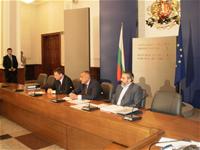A Bulgarian story of "the good" gas and "the bad" gas
Ralitsa Kovacheva, July 16, 2010
 Sometimes the details around an event say more than the actual plot of the story. I have realized this fact after a few hours stay in the Council of Ministers of Bulgaria, awaiting news from the Cabinet’s meeting. Actually, I had specific questions to a certain minister and because of the actuality of his work I have assumed (quite wrongly by the way!) that there was great probability that he would appear at the regular press conference. Turned out, however, that for several weeks no briefings were being held, and journalists are forced to prowl after ministers at the stairs. And even though there is a microphone and a speaker installed in the lobby - cameras, microphones and acrimonious reporters literally pile over the victim who had dared to pass by.
Sometimes the details around an event say more than the actual plot of the story. I have realized this fact after a few hours stay in the Council of Ministers of Bulgaria, awaiting news from the Cabinet’s meeting. Actually, I had specific questions to a certain minister and because of the actuality of his work I have assumed (quite wrongly by the way!) that there was great probability that he would appear at the regular press conference. Turned out, however, that for several weeks no briefings were being held, and journalists are forced to prowl after ministers at the stairs. And even though there is a microphone and a speaker installed in the lobby - cameras, microphones and acrimonious reporters literally pile over the victim who had dared to pass by.
I am telling you this, as a wordy lawyer would say to a judge in a trial, because later you will understand how important this detail appears to be for the overall picture. While I was wondering whether it was useful for me to wait any longer, the colleagues rushed to the press room and it became clear all of a sudden that the Prime Minister himself was coming. He appeared, accompanied by the Chief of Bulgargas (the state-owned gas company) Dimitar Gogov and the President of the state energy regulator Angel Semerdzhiev. The reason for their presence is their reports, respectively, on the price of gas and on the operation of gas and electricity distribution companies.
Dimitar Gogov started with some statistics on the structure of gas supplies. I will  mention it because it is important, although probably well known. Currently, Russian gas is coming to Bulgaria via Gazpromexport through "three channels” (after the words of Gogov): "One is Zarubezhgaz or now Gazprom Bulgaria, then Wintershall and Bulgargas. The other is Overgas Inc, selling over to Bulgargas and the third is providing very small amounts, coming directly from Gazprom to Bulgargas. According to this structure 60% more or less are the quantities we buy from “Overgas”, the other mainly by “Wintershall"".
mention it because it is important, although probably well known. Currently, Russian gas is coming to Bulgaria via Gazpromexport through "three channels” (after the words of Gogov): "One is Zarubezhgaz or now Gazprom Bulgaria, then Wintershall and Bulgargas. The other is Overgas Inc, selling over to Bulgargas and the third is providing very small amounts, coming directly from Gazprom to Bulgargas. According to this structure 60% more or less are the quantities we buy from “Overgas”, the other mainly by “Wintershall"".
Regarding the price (the current quarter the price of gas, entering Bulgaria is $338 and 40 cents): "Around 65% (between 60 and 67%) of the price for the consumers is the import price. Out of these 67%, 1.5% is the surplus charge of Bulgargas, which is aimed at covering the company's costs (here I feel bitter self-irony in the voice of the speaker). About 3.5 percent is the charge for transmission via the Bulgarian gas network. And the remaining approximately 32% are left to the gas distribution companies. These are average figures. "
According to Gogov, the structure of gas prices is similar in most countries in Central and Eastern Europe. However:
"The only thing that is essential in Bulgaria is that one of the structures - gas distribution companies, their parent company receives practically additional revenues, which in no way affect the final cost for the consumers. I am talking about Overgas Inc. I cannot know what is the price at which Overgas Inc buys from Gazpromexport, but presumably and according to documents I have, it is within a range of about 6 to 7 and a half percent, more like 6 and half percent profit for the company Overgas Inc. Which, if we calculate it on the basis of the volumes, paid by Bulgargas to Gazpromexport through Overgas Inc, amounts to over $140 million for the period from 1998 to mid 2010. This money should, at least after words that I have heard and also by the Prime Minister ten days ago here, be invested in the development of the Bulgarian gas distribution network."
I can feel the resentment in his voice but I’m still wondering what the purpose of this speech is. In order to disperse any doubts, Prime Boyko Borissov intervenes and the briefing turns into a game of questions and answers. So I will give you part of the dialogue as it was:
Borissov: The price of gas - high or low?
Gogov: Currently high for Bulgargas, low for consumers, I would say. Because from the beginning of the year we sell at a price lower than the one at which we buy the gas. That's why we work to convince our partners from Gazpromexport for a contract that takes into account these nuances and provides normal parameters for the price of gas at the entrance.
Borissov: What happens to a company which purchases at a high cost and sells cheaper?
Gogov: It is being uncapitalized. Or it is being restructured or goes to bankruptcy.
Borissov: How we are you going to restructure it since ... ?
Gogov: ... Having nothing to structure.
Borissov: This story is very much like what people in Tran (a Bulgarian town) say - “I cut it three times, but it is shorter and shorter. And I'll cut it on more time.” How can you buy expensive, sell cheaper and say that it will get restructured. There is no economic logic. There will be, if you buy cheap, sell expensive, and the difference will go 100 percent in the state-owned company, so you can look for ways to invest. Or reduce the price for the consumers.
Borissov: We don't have the price at which Gazprom sells [gas] to the intermediaries?
Gogov: We do not have it, we can only guess and this is why I said that our assumptions are that there is about 6 percent and a half difference in favour of the intermediary. 6% at least.
Borissov: 6 percent and a half over 3.3 billion cubic meters of gas ...
Gogov: I'm saying it again - for 12 years, only for one of the actors in the chain, this is about 140-150 million dollars.
Borissov: Profit!
Gogov: Difference in this price. For one of the intermediaries. The prices of the other one are 40 dollars on the average more expensive than that. Or they had reached even 40 dollars.
Borissov: This means all negotiations on gas in all these years were being held in a way that we do not know the real price at which Gazprom sells gas and we do not actually know the profits of those downstream.
Gogov: Exactly.
Here euinside asks if, as announced, Overgas would conclude an independent contract with Gazprom by early next year (i.e. it is no longer part of the chain) how will this affect the structure of the price and the negotiations currently under way with Russia. Of course, if I have understood correctly that the presented facts suggest that the biggest rise in the price at the border comes from Overgas.
Here's the answer of Dimitar Gogov: "Here you mix many details, without actually knowing the facts. I did not say that the biggest increase comes from them; I said that the share of Overgas's sales was highest. Bulgarian law allows everyone who wants to engage in gas trading. Note, that only Bulgargas is a subject to a licensing and regulation regime. Any company registered in the commercial register, is free to trade with gas. I consider this to be unfair because everyone can get information about what Bulgargas is doing and what are the parameters of its deals and hence make its own policy. "
I still cannot get it how come he did not say that, since the quantity that Bulgargas buys from Overgas is the greatest and therefore their prices should affect the total price at the most. But anyway, I do not understand. I also wanted to ask, since Gogov himself says that "the other company's ("Wintershall ") prices are on average 40 dollars more expensive than that”, why are we spending an hour dealing with Overgas instead of the other firm.
And I’m mostly interested in the question how come, based upon "assumptions" and "presumptions" information is being announced so easily and criticism is being suggested towards any company. And someone is making me feel patriotic sympathy with the state-owned company Bulgargas, which, the suggestions is - takes losses, lest people suffer while others make profits at their expense. And who determines what is a good and what is a bad market? I know the answer: there is no market.
And since, as you know, trade secrets prevent any details to be revealed about the contracts and gas prices, one of the few experts on the topic is Rumen Ovcharov (former Minister for Energy). Accidentally or not, only a few hours earlier Ovcharov said on the public television: "Half of the quantity of gas is being delivered without a commission for an intermediary, otherwise the commission is not small at all. Overgas, although doing sales, gets only $1 fee per 1,000 cubic meters and no commission as a mediator. The other mediator's commission is over 10%. "
It is not necessarily Ovcharov to be telling the truth, but the difference in figures is quite serious. According to Overgas's data, the company has so far invested more than $300 million and has built more than 2.500 km of pipeline network. The company did not comment on the announced margins and its relationship with Gazpromexport, but it described the 140 million dollar profit as a "bluff." The state energy regulator is currently conducting a review of all distribution companies and the results are expected soon about pricing and investments. But even before any results are known, the lesson is clear - as the Bulgarian expression goes, cited by the Prime Minister:
“This story is like people in Tran say- “I cut it three times, but it is shorter and shorter. And I'll cut it one more time.” How can you buy expensive, sell cheaper and say that it will get restructured. There is no economic logic. There will be, if you buy cheap, sell expensive, and the difference remains 100 percent in the state-owned company so you can look for ways to invest. Or reduce the price for the consumers.”
Certainly there is no economic logic, but there is no logic in deliberately pointing fingers at presumably "bad" guys either, to justify the incapability of the “good” ones. Because, I am again asking, if Overgas is no longer an intermediary from next year, even assuming that all the intermediaries are removed, what is the guarantee that Russia will "take into account the nuances” (after the words of Gogov) and will respond with understanding to the Bulgarian interest? Russia, which supplies one hundred percent of the gas Bulgaria consumes? And which made an ultimatum in 2006 - either renegotiation of the deal or after 2010 the transit through Bulgaria will be redirected to other countries, again after the words of Gogov.
Rumen Ovcharov, who probably knows how to negotiate with Russia, says: "Do you know what the simple truth is? The option of keeping the then contract, was not available." Perhaps Prime Minister Borissov is also aware of this: "In the next few days very tough negotiations are coming up, because you see how it was being negotiated, what was signed, how negotiations are conducted with us and I do not know now whether we have a choice.”
 We all realise that when you're dependent, you are not in a position to dictate terms. Obviously, however, the forthcoming outcome of the gas negotiations, makes the government reinsure itself and is fanning up smoke. But the prescription is simple, Boyko Borissov himself said it, although he meant the previous government:
We all realise that when you're dependent, you are not in a position to dictate terms. Obviously, however, the forthcoming outcome of the gas negotiations, makes the government reinsure itself and is fanning up smoke. But the prescription is simple, Boyko Borissov himself said it, although he meant the previous government:
"If I have led such negotiations, I would have not call them a spectacular success, “Grand Slam”, and profitable for Bulgaria. I would go out and publicly say - these are the conditions, let people know what the options are. I don’t remember such a thing to have ever been done."
Well, Mr Prime Minister, now you have a chance to be the first to do so.